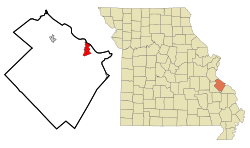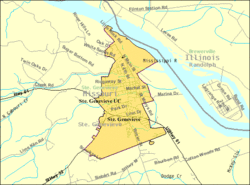Sainte Genevieve, Missouri
| Ste. Genevieve, Missouri | |
|---|---|
| City | |

Maison Bequette-Ribault
c. 1805 privately owned |
|
| Nickname(s): "The Mother City of the West" | |
 Location of Ste. Genevieve, Missouri |
|
 U.S. Census Map |
|
| Coordinates: 37°58′37″N 90°2′55″W / 37.97694°N 90.04861°WCoordinates: 37°58′37″N 90°2′55″W / 37.97694°N 90.04861°W | |
| Country | United States |
| State | Missouri |
| County | Ste. Genevieve |
| Township | Ste. Genevieve |
| Incorporated | 1805 |
| Named for | Saint Genevieve |
| Area | |
| • Total | 4.11 sq mi (10.64 km2) |
| • Land | 4.10 sq mi (10.62 km2) |
| • Water | 0.01 sq mi (0.03 km2) |
| Elevation | 560 ft (170.7 m) |
| Population (2010) | |
| • Total | 4,410 |
| • Estimate (2012) | 4,316 |
| • Density | 1,075.6/sq mi (415.3/km2) |
| Time zone | Central (CST) (UTC-6) |
| • Summer (DST) | CDT (UTC-5) |
| Zip code | 63670 |
| Area code(s) | 573 |
| FIPS code | 29-64180 |
| GNIS feature ID | 0727043 |
| Website | http://www.stegenevieve.org/ |
Ste. Genevieve (Ste-Geneviève with French spelling) is a city in Ste. Genevieve Township and is the county seat of Ste. Genevieve County, Missouri, United States. The population was 4,410 at the 2010 census. Founded in 1735 by French Canadian colonists and settlers from east of the river, it was the first organized European settlement west of the Mississippi River in present-day Missouri.
Founded around 1735 by Canadien settlers and migrants from settlements in the Illinois Country just east of the Mississippi River, Ste. Geneviève is the oldest permanent European settlement in Missouri. It was named for Saint Genevieve (who lived in the 5th century AD), the patron saint of Paris, the capital of France. While most residents were of French-Canadian descent, many of the founding families had been in the Illinois Country for two or three generations. It is one of the oldest colonial settlements west of the Mississippi River. This area was known as New France, Illinois Country, or the Upper Louisiana territory. Traditional accounts suggested a founding of 1735 or so, but the historian Carl Ekberg has documented a more likely founding about 1750. The population to the east of the river needed more land, as the soils in the older villages had become exhausted. Improved relations with hostile Native Americans, such as the Osage, made settlement possible.
...
Wikipedia
